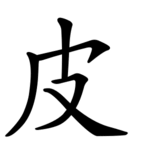Radical 107
 From Wikipedia the free encyclopedia
From Wikipedia the free encyclopedia
| 皮 | ||
|---|---|---|
| ||
| 皮 (U+76AE) "skin, hide" | ||
| Pronunciations | ||
| Pinyin: | pí | |
| Bopomofo: | ㄆㄧˊ | |
| Wade–Giles: | p'i2 | |
| Cantonese Yale: | pei4 | |
| Jyutping: | pei4 | |
| Japanese Kana: | ヒ hi (on'yomi) かわ kawa (kun'yomi) | |
| Sino-Korean: | 피 pi | |
| Names | ||
| Japanese name(s): | 毛皮/けがわ kegawa ひのかわ hinokawa | |
| Hangul: | 가죽 gajuk | |
| Stroke order animation | ||
 | ||
Radical 107 or radical skin (皮部) meaning "skin" or "hide" is one of the 23 Kangxi radicals (214 radicals in total) composed of 5 strokes.
In the Kangxi Dictionary, there are 94 characters (out of 49,030) to be found under this radical.
皮 is also the 119th indexing component in the Table of Indexing Chinese Character Components predominantly adopted by Simplified Chinese dictionaries published in mainland China.
Evolution
[edit]- Bronze script character
- Large seal script character
- Small seal script character
Derived characters
[edit]| Strokes | Characters |
|---|---|
| +0 | 皮 |
| +3 | 皯 |
| +5 | 皰 皱SC (=皺) |
| +6 | 皲SC (=皸) |
| +7 | 皳 皴 |
| +8 | 皵 |
| +9 | 皶 皷 皸 皹 (=皸) |
| +10 | 皺 |
| +11 | 皻 |
| +12 | 皼 |
| +13 | 皽 |
| +15 | 皾 |
Sinogram
[edit]The radical is also used as an independent Chinese character. It is one of the Kyōiku kanji or Kanji taught in elementary school in Japan.[1] It is a third grade kanji[1]
References
[edit]- ^ a b "The Kyoiku Kanji (教育漢字) - Kanshudo". www.kanshudo.com. Archived from the original on March 24, 2022. Retrieved 2023-05-06.
Literature
[edit]- Fazzioli, Edoardo (1987). Chinese calligraphy : from pictograph to ideogram : the history of 214 essential Chinese/Japanese characters. calligraphy by Rebecca Hon Ko. New York: Abbeville Press. ISBN 0-89659-774-1.
- Lunde, Ken (Jan 5, 2009). "Appendix J: Japanese Character Sets" (PDF). CJKV Information Processing: Chinese, Japanese, Korean & Vietnamese Computing (Second ed.). Sebastopol, Calif.: O'Reilly Media. ISBN 978-0-596-51447-1.


